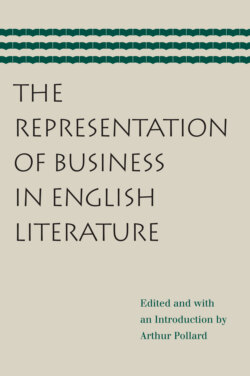Читать книгу The Representation of Business in English Literature - Группа авторов - Страница 18
На сайте Литреса книга снята с продажи.
WEALTH AND GREATNESS THE CAUSE OF CORRUPTION
ОглавлениеAdam Smith both commented on and criticised this social aspiration to emulate the great landed proprietors. In The Theory of Moral Sentiments he observed the “disposition of mankind to go along with all the passions of the rich and the powerful.” He went on to deplore it as
the great and most universal cause of the corruption of our moral sentiments. That wealth and greatness are often regarded with the respect and admiration which are due only to wisdom and virtue; and that the contempt, of which vice and folly are the only proper objects, is often most unjustly bestowed upon poverty and weakness, has been the complaint of moralists of all ages.38
The discrepancy between the social and moral hierarchies was also a concern of the eighteenth-century novel. Although it is often regarded as a bourgeois art form it is much more concerned with the landed classes than with the business world. Eighteenth-century novelists explored the social relationships of the aristocracy and gentry rather than those of the middle classes. Insofar as they dealt with concerns of those below the landed elite they tended to discuss professional men—the clergy, doctors, lawyers and soldiers—rather than merchants and manufacturers.
Until the 1790s novelists did not generally attack the landed elite per se. On the contrary, while they castigated landlords who abused their privileged position, they held out the prospect of their heroes and heroines acquiring elite status as a desirable goal. Under the impact of the French Revolution, however, novels began to appear which challenged the desirability of identifying with aristocracy as such. In Gothic novels aristocrats were depicted as exploiters of their position in society in order to exert social and psychological terror over their inferiors. The most notorious of these figures was Montoni, the tyrannical Italian nobleman of Anne Radcliffe’s sensational Mysteries of Udolpho. He was but the archetype of Gothic villains in this popular genre. Jacobin novels were even more explicit in their condemnation of aristocrats. Godwin’s Caleb Williams castigated not just individuals who failed to live up to the patriarchal ideals of aristocracy but the very system itself which sustained the landed elite in its position.
Writers in the late eighteenth century did not, however, espouse bourgeois values to offset those of the aristocracy. On the contrary they deplored the increasing urbanisation of the century’s closing decades and advocated a rural rather than an urban way of life. In the incipient class war associated with industrialisation they tended to sympathise with the poor against their new exploiters, the industrial entrepreneurs. The early Romantics thus anticipated the debate on whether the social impact of the Industrial Revolution had been more detrimental than beneficial, a debate which still can divide historians into optimists and pessimists. The Romantic view was definitely pessimistic.
William Cowper anticipated the Lake poets in many ways in his poem The Task, and not least in deploring the way men had lost sight of Nature in cities which “breathe darkness all day long.” The celebrated Preface to Lyrical Ballads in 1798 criticised “the increasing accumulation of men in cities.” As for the impact of industry, Blake’s condemnation of “dark satanic mills” is well known, though it can be disputed whether it refers to factories or mental processes. A less equivocal critique of industrialisation came from Robert Southey who, writing about the increase in poverty in his Letters from England (1807), claimed that
many causes have contributed to the rapid increase of this evil . . . . But the manufacturing system is the main cause; it is the inevitable tendency of that system to multiply the number of the poor, and to make them vicious, diseased and miserable.
He illustrated these propositions by getting the fictitious author of the Letters, Don Manuel Alvarez Espriella, to visit a Manchester cotton mill. It employed two hundred hands, including small children. The mill owner assured Espriella that they were well treated. “Here Commerce is the queen witch,” observed the Don, “and I had no talisman strong enough to disenchant those who were daily drinking of the golden cup of her charms.” For in Southey’s view the reality was very different. Debauchery, disease, ignorance and poverty were prevalent. The employees either died of diseases inherent in their environment,
or they live to grow up without decency, without comfort and without hope, without morals, without religion, and without shame, and bring forth slaves like themselves to tread in the same path of misery.39
